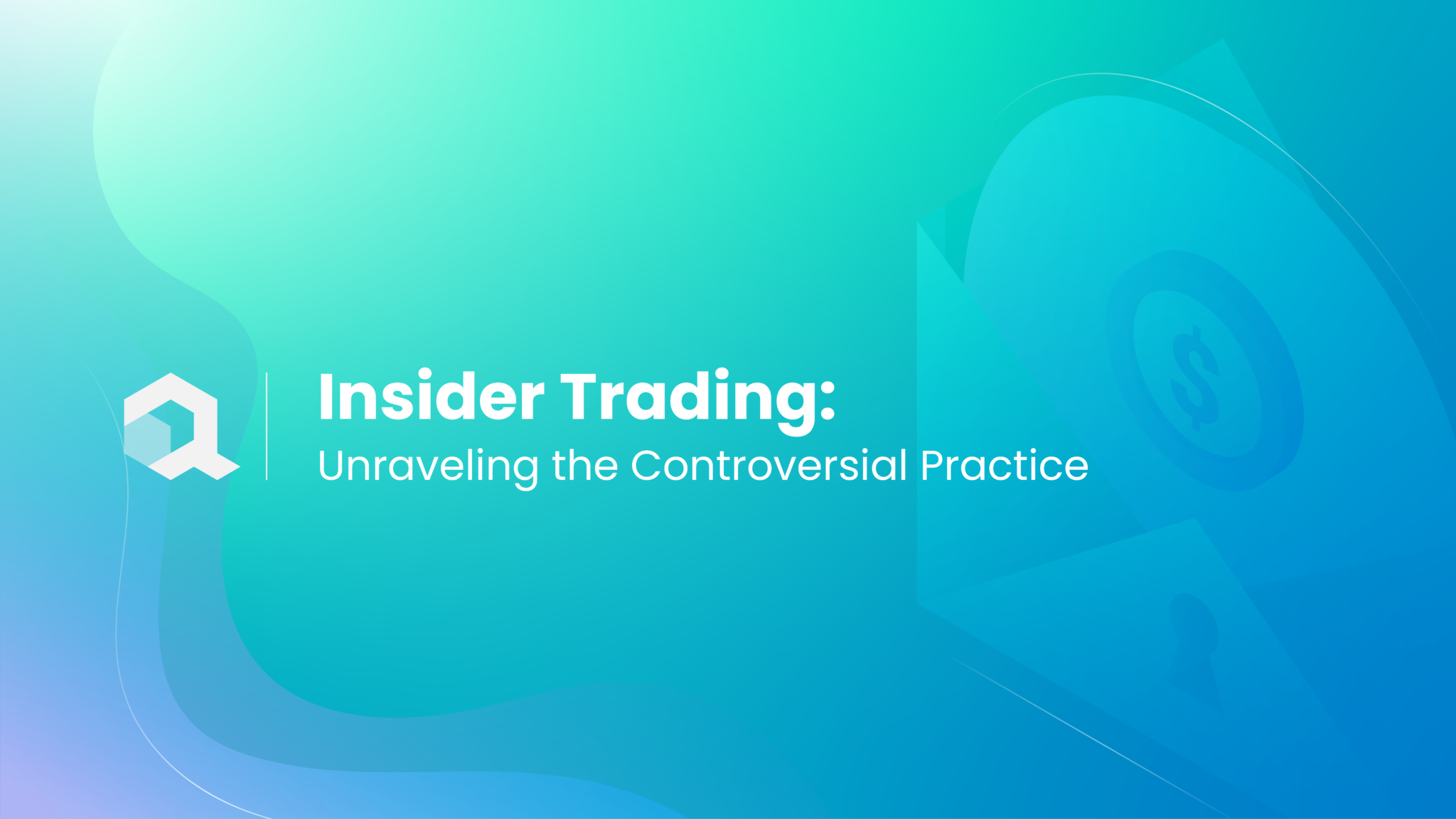
Insider trading involves buying or selling securities when someone has confidential information about the company or the security. It breaks the trust between the insider and the public. In order to protect investors and maintain the integrity of the financial markets, the enforcement and prevention of insider trading are necessary. This is especially important in building trust among the public in the institutions governing our global economic system.
The changing financial environment will continue to have an impact on how insider trading is perceived and handled, and this will affect how regulations are created and companies operate, as well as how people think about it. Finding a common point where different people agree is important for creating a fair and ethical financial system where everyone can trust and feel confident. In many places, this behavior is not allowed because it goes against what’s fair and transparent in financial markets. In this essay, we’ll delve into the crucial components of insider trading, its consequences, and the measures taken to prevent this malicious activity.
Key Aspects of Insider Trading

The issue of insider trading is prevalent in financial markets, and it involves the secretive buying and selling of securities based on non-public information. This makes it a critical issue that shapes its dynamics. This practice is viewed as unethical because it encroaches upon the principles of confidentiality and trust, both of which are fundamental to the functioning of any business. A stock’s price will be greatly affected by information that is considered significant. The regulatory bodies, specifically the U.S. Securities and Exchange Commission (SEC), play a key role in making sure that rules and regulations are strictly followed to prevent insider trading. The rules are created to protect the financial markets by punishing those who break their norms with penalties, imprisonment or civil actions.
It is the duty of the insiders to file the reports with the SEC, which increases the level of transparency and enables us, the public, to examine the trading practices. To stop insider trading more strictly, many organizations put in place internal policies to control how information is shared, trading time, and the blackout period. There are certain time periods when insiders can’t trade their stock, called blackout periods and trading windows. These policies are aimed at creating a transparent and equitable work environment.
It is not only restricted to the country where it is being conducted. It has an international impact. Different countries have different rules and laws related to this topic, so it is important for people who do business internationally to understand these differences. Compliance is very important because there are many severe consequences for those who don’t comply with rules like insider trading, and that not only can effect the individual but can effect the company’s reputation as well.
Companies often invest in programs aimed at educating their employees and preventing unintentional insider trading breaches. Some of these tools may contain instructional sections, resources or other material, as well as periodic updates to keep users informed of any changes that affect their operations. By building an ethical atmosphere of lawfulness, managers prioritize being responsible in their work decisions in order to minimize insider trading risks.
Prevention and Enforcement of Insider Trading

Preventing and enforcing insider trading is an intricate process that requires a range of measures, including laws, regulations, corporate governance, and educational initiatives. Here’s a more detailed exploration of key elements in the prevention and enforcement of insider trading:
– Regulatory Frameworks
Insider trading regulations are very essential in financial market supervision. A framework defines the limits of decent conduct and outlines the regulations used to trade non-public information for stocks. In our country, the Securities and Exchange Commission (SEC) oversees and makes sure that the rules related to insider trading are being followed.
The given sentence states that these laws serve as the legal basis for prosecuting people involved in insider trading activities. Usually, regulations specify what insider trading means, what information is material, and what the consequences are when someone violates it. It lays down the trade reporting rules to be followed by insiders and provides information to help investors make informed decisions. In short words, regulatory frameworks keep financial markets transparent.
– Market Surveillance
Regulatory bodies employ a proactive approach known as market surveillance to prevent insider trading by detecting any possible incidents. These advanced surveillance systems use the latest technology to check the activities of traders on stock exchanges. It includes data analytics and algorithmic monitoring. These algorithms can detect any kind of unusual activity, like sharp hikes in stock prices or unexpected changes in stock volume, that might lead to insider trading.
The objective is to quickly identify fraudulent activities and initiate investigations to maintain market integrity. The surveillance systems have become a necessary tool to maintain the trust of shareholders in the market, as they assure them that their money is being used ethically and that the regulatory bodies are working effectively to prevent any violations. These systems are regularly updated in order to stay one step ahead of any complex techniques used by individuals attempting to engage in illegal insider trading. This helps maintain the strength of legal supervision.
– Legal Consequences and Deterrence
It is absolutely essential to deter insider trading by imposing legal consequences. The consequences of insider trading violations are pretty harsh, meant to make people think twice before going down the wrong path. The penalties for breaking the law can be really harsh, such as paying big fines, going to jail and losing all the illegal earnings.
By imposing such penalties, not only are wrongdoers being punished, but it also sends a strong message to the whole financial society about the severity of insider trading. The idea of getting punished severely reminds us of the importance of being honest and trustworthy in financial markets. On top of that, the threat of being sued or imprisoned is a way to protect against people who might abuse their power for personal benefit, which helps to make sure everyone follows the rules.
Also Read: Market Making: Strategies and Techniques
– Market Surveillance
Regulatory bodies employ a proactive approach known as market surveillance to prevent insider trading by detecting any possible incidents. These advanced surveillance systems use the latest technology to check the activities of traders on stock exchanges. It includes data analytics and algorithmic monitoring. These algorithms can detect any kind of unusual activity, like sharp hikes in stock prices or unexpected changes in stock volume, that might lead to insider trading.
The objective is to quickly identify fraudulent activities and initiate investigations to maintain market integrity. The surveillance systems have become a necessary tool to maintain the trust of shareholders in the market, as they assure them that their money is being used ethically and that the regulatory bodies are working effectively to prevent any violations. These systems are regularly updated in order to stay one step ahead of any complex techniques used by individuals attempting to engage in illegal insider trading. This helps maintain the strength of legal supervision.
– Legal Consequences and Deterrence
It is absolutely essential to deter insider trading by imposing legal consequences. The consequences of insider trading violations are pretty harsh, meant to make people think twice before going down the wrong path. The penalties for breaking the law can be really harsh, such as paying big fines, going to jail and losing all the illegal earnings.
By imposing such penalties, not only are wrongdoers being punished, but it also sends a strong message to the whole financial society about the severity of insider trading. The idea of getting punished severely reminds us of the importance of being honest and trustworthy in financial markets. On top of that, the threat of being sued or imprisoned is a way to protect against people who might abuse their power for personal benefit, which helps to make sure everyone follows the rules.
– Information Barriers and Restricted Lists
To maintain the security and confidentiality of crucial data within institutions, entities put up walls that prevent unauthorized people from gaining access to sensitive information. These arrangements, referred to as “Chinese walls,” keep employees possessing secret information from communicating with other departments or external contacts.
Another thing that companies do is create a list of securities which employees are not allowed to trade in. These lists can be updated as per the needs of the time, which can include impending financial disclosures or major events in a company. Companies prevent insider trading by setting up protocols that limit access to confidential data and prevent employees from taking advantage of this information to make personal profits. This protects the company’s interests and provides a secure space for trading activities to take place.
Also Read: Automatic Market Makers : Things You Should Know
– Whistleblower Programs
Whistleblower programs play a vital role in preventing fraudulent activities. These programs are helpful as they provide a safe environment for individuals to report insider trading practices without any fear of bullying or any other negative consequences. Anonymity provides an incentive for people to report misdeeds by management; this way, the Constitution is safe.
Tips from whistleblowers help initiate investigations; however, they complement other things as well, such as monitoring and surveillance. These programs have the great feature of accessing the inner knowledge of the people, which helps them find out the dishonesty, and it plays a really vital role in the enforcement of the rules for insider trading prevention.
– International Collaboration
Because of the global nature of financial markets, the practice of insider trading is not limited to any particular country, and thus, international cooperation is necessary to address this issue. Most of the time, various regulatory agencies across the globe work together to exchange knowledge, cooperate during probes, and maintain a consistent strategy regarding insider trading restrictions.
Working with other countries can improve the success of actions taken to control illegal activities, and it helps to learn from others. The International Organization of Securities Commissions (IOSCO) provides platforms where regulatory bodies globally come together and exchange ideas to combat insider trading. This approach acknowledges the interdependence of the financial markets and underscores the significance of concerted efforts to combat illegal activities in a coordinated manner across borders.
3 Multiple Perspectives on Insider Trading

There are many different opinions about insider trading, and these opinions come from a variety of different fields of study, such as law, economics, and ethics. Here are three distinct perspectives on insider trading:
1. Legal Perspective
The legal system takes insider trading very seriously in order to safeguard the honesty of stock markets. Insider trading is clearly defined and has strict rules, such as the U.S. Securities and Exchange Commission (SEC) rules, to prevent personal gain in trading securities using material non-public information. Corporate insiders are said to have a legal obligation to do what’s best for the company and its investors, which is their fiduciary duty. If someone breaks this duty by doing insider trading, that person can be punished with serious consequences. It can lead to fines and imprisonment, and the person has to return all of their money.
Legal frameworks established to penalize wrongdoing serve as a deterrent, preventing people from misusing confidential data. It is important that financial markets be transparent so that investors feel confident. This highlights the significance of strong regulation and clear legal frameworks to prevent insider trading and maintain fair and ethical standards in the stock market.
2. Economic Perspective
From an economic standpoint, the debate over insider trading is nuanced, with some people arguing that it is inefficient and affects fairness in the market. Others argue that it can help improve markets by providing more liquidity and improving transparency. Nonetheless, insider trading remains a controversial issue within the investing community. Some students think that insider trading can be beneficial in certain instances because it adds private information to the stock market. In theory, this is how the market works. When information is available, markets can reflect it and allocate capital accordingly. In my opinion, insider trading can be viewed as a normal occurrence in the market, and the prices adjust quickly to any new information that becomes available.
Critics argue that economic consequences should be considered when discussing insider trading. In my opinion, there should be laws and regulations that protect and promote equity and fairness in the market. In my opinion, a market that has equal access to information for all investors and is fair and transparent is very important to maintain the proper working of the financial systems. As a student, I know that the economic perspective highlights the ongoing debate between promoting market efficiency and ensuring that everyone has a fair chance in the market. This requires careful balance and sometimes requires the implementation of regulations to maintain that balance.
3. Ethical Perspective
The piece writes that insider trading from an ethical viewpoint will contemplate the values of morality, correctness, and corporate responsibility. According to ethical standards, insider trading is typically considered a violation of trust and a breach of the principles that form the foundation of a fair and transparent market. This rule is in place to ensure that confidential information is not misused for unethical purposes. The ethical point of view focuses on the long-term effects of insider trading on all stakeholders, such as company shareholders, workers and the general public. It raises discussions about the moral responsibilities of the personnel in the firms to put community well-being ahead of their own gain.
This approach goes beyond just following laws and urges companies to develop a moral code. It is important to have values of honesty, accountability and transparency in organizational practices because ethical considerations highlight these values. When a company prioritizes ethical behavior, they’re not just avoiding legal issues; they’re establishing a reputation for being trustworthy, which is super important for maintaining relationships with customers, investors, and other stakeholders. For me as a student, preventing any kind of unfair practices or unethical conduct is a crucial part of maintaining business ethics. It is not a legal obligation but a responsibility that needs to be followed to maintain trust in the corporate governance structure.
Conclusion
Insider trading is a complex problem that involves legal, economic, and ethical elements. According to the laws, there are strict regulations and penalties to prevent the use of confidential information for making profits in the stock market. The views on insider trading differ among the economic disciplines; while some people say that it promotes market efficiency through the sharing of important data, others have highlighted that a level playing field is necessary to maintain the market’s integrity. From an ethical standpoint, selling shares is generally viewed as a violation of trust and organizational duty, meaning it is crucial to promote an atmosphere of trustworthiness and openness in companies.
The topic of insider trading is always in the news, and it shows how hard it can be to deal with the stock market. It is important for legal frameworks to adjust to new problems that arise; economic thinking needs to balance productivity and social equality; and ethics dictate that society’s welfare should be given more priority than personal profits. This balance requires consistent effort to improve the regulations, create an ethical corporate culture, and educate people.
Disclaimer: The information provided by Quant Matter in this article is intended for general informational purposes and does not reflect the company’s opinion. It is not intended as investment advice or a recommendation. Readers are strongly advised to conduct their own thorough research and consult with a qualified financial advisor before making any financial decisions.

I craft stories that make complex ideas clear. I simplify the blend of data science, machine learning, and crypto trading, showcasing how advanced tech and quantitative models analyze data for informed trading choices. Join me in exploring the realm of quantitative trading, where my narratives make intricate concepts easy to grasp.
- Alifia Berizkyhttps://quantmatter.com/author/alifia-berizky/
- Alifia Berizkyhttps://quantmatter.com/author/alifia-berizky/
- Alifia Berizkyhttps://quantmatter.com/author/alifia-berizky/
- Alifia Berizkyhttps://quantmatter.com/author/alifia-berizky/
